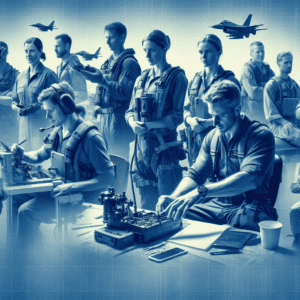Between 1981 and 1987 I served in the Royal Australian Air Force. I can’t tell you anything about it, but yes, I served my country and lived with my life in their hands.
Along the way, I made some lifelong friends, developed the inky-black sense of humour that comes with military life, and earned a couple of medals.
To understand a Military Veteran, you must know:
- We left home as teenagers or in our early twenties for an unknown adventure.
- We loved our country enough to defend it and protect it with our own lives.
- We gave our lives to the military and Government of the day. They could ship us out at a moment’s notice—we never knew if the bed we went to sleep in would be the same bed we went to sleep in the next night. And the RAAF and the Government could send us into killing fields knowing we would never come back, and we could never say ‘No’.
- If we signed the OSA (Official Secrets Act—which I did, on Day 1) we cannot talk about anything we experienced in the military. Forever, or at least until we die. Not what we did, where we went, what we saw, what we smelt, what we heard, what we thought… nothing.
- We said goodbye to friends and family and everything we knew.
- We learned the basics and then we scattered in the wind to the far corners of the Earth.
- We met some priceless characters, and we met some Olympic-level drop-kicks.
- We met colleagues who we respected immensely for their compassion, integrity, and intellect.
- We met some officers that we were not worthy to tie their shoelaces.
- But equally, we met some colleagues and officers who were mind-numblingly dumb, frustrating, incompetent and little more than brown-nosing soggy excuses for nitrogenous compounds.
- We found new friends and family.
- We became brothers and sisters regardless of colour, race or creed.
- We had plenty of good times, and plenty of bad times.
- We didn’t get enough sleep.
- We smoked and drank too much. Most of us ended up with some sort of addiction, usually to alcohol.
- We picked up both good and bad habits.
- We worked hard and played harder.
- We didn’t earn a great wage. Even now, decades later, the pension is still—get this—$330 per week BELOW the poverty line. “Thanks for your service, mate, and for putting your life on the line for us, but we can’t afford to give you a liveable income.”
- We have kept our mouths shut and laughed silently to ourselves when blokes around a bbq tell tales of how brave and strong they are. “Brave enough to put your life on the line and maybe die?” we chuckle to ourselves.
- We experienced the happiness of phone calls from family and friends back home, and the sadness of missing important events.
- We didn’t know when, or even if, we were ever going to see home again.
- We grew up fast, and yet somehow, we never grew up at all.
- We fought for our freedom, as well as the freedom of others.
- Some of us saw actual combat, and some of us didn’t.
- Some of us saw the world, and some of us didn’t.
- Some of us dealt with physical warfare, most of us dealt with psychological warfare.
- We have seen and experienced and dealt with things that we can’t fully describe or explain, as not all of our sacrifices were physical.
- We took part in time-honoured ceremonies and rituals with each other, strengthening our bonds and camaraderie.
- We counted on each other to get our job done, and sometimes to survive it.
- A few of us have passed out on the parade ground when parades in the heat went on too long. That includes me.
- We experienced long periods of mind-numbing boredom punctuated by too-short periods of intense activity.
- We learned how to iron our shirts so that there were no tramlines on the sleeves.
- We learned how to break in cheap leather boots and polish them with a toothbrush.
- We learned how to iron our trousers so that the creases in the legs stayed creased all day.
- We learned the importance of washing our clothes in starch, which we bought in multiples of large cardboard boxes. We used a whole box for each load of the washing machine.
- We learned how to shine our parade shoes so that they reflected the sun, the clouds, and our pride.
- We have dealt with victory and tragedy.
- We have celebrated and mourned.
- We lost a few along the way.
- When our adventure was over, some of us went back home, some of us started somewhere new and some of us never came home at all.
- We have told amazing and hilarious stories of our exploits and adventures—but only to our colleagues who were there. No one else knows or can know what we did.
- We share an unspoken bond with each other that most people don’t experience, and few will understand.
- We speak highly of our own branch of service, and poke fun at the other branches.
- We know however, that, if needed, we will be there for our brothers and sisters in the other branches in a heartbeat and stand together as one.
- Being a Veteran is something that had to be earned, and it can never be taken away.
- It has no monetary value, but at the same time it is a priceless gift.



